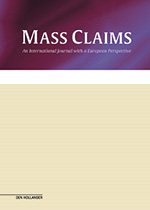D.R. Hensler1In a world awash with academic journals, practice notes and blog posts, do we really need a new journal devoted to mass claims? Yes! Oddly, as mass claims increase in frequency in countries worldwide – the result of natural catastrophes, man-made disasters, defective products, questionable financial practices and a host of other activities that cause widespread personal injury and financial loss – they have not been the focus of traditional scholarly and professional journals. Although "mass torts" may come to mind when we read the words "mass claims," not all mass claims are... abonneren of dit artikel .
G. Potjewijd, S.V. Yakovleva, F. Aguilar de Carvalho, C. Derrig, J. Fulton, S. Gallage-Alwis, A. Ferreres Comella en V. Wettner1This contribution discusses mass claims[2] seeking non-material damages for data privacy infringements under Articles 80 and 82 of the General Data Protection Regulation (GDPR). It contributes to the understanding of these provisions by offering a comparative perspective of how they were implemented in France, Germany, Ireland, Netherlands, Spain, Portugal and the UK (collectively referred to in this article as 'covered jurisdictions'). The authors highlight the points of convergence and divergence regarding the implementation of Articles 80 and 82 GDPR in these jurisdictions and analyse... abonneren of dit artikel .
P. Oberhammer1Opinion piece The Directive on representative actions for the protection of the collective interests of consumers of 25 November 2020 does not address jurisdiction for representative actions. Therefore, the Brussels I bis Regulation continues to apply to most cases of collective actions in Europe. The contribution explains the jurisdictional framework of this Regulation with respect to collective redress, discusses the problems resulting from this, and finally makes a few policy recommendations. 1. Introduction As is generally known, jurisdict... abonneren of dit artikel .
J. Kalajdzic2 abonneren of dit artikel .
J.M. Niemczyk en A. Gayibli1Machteld de Monchy and Till Schreiber in debate with judges Peter Roth (High Court of England and Wales, UK Competition Appeal Tribunal), Mieke Dudok van Heel (District Court of Amsterdam, Netherlands Commercial Court), Fabian Reuschle (Stuttgart Regional Court) and Maria Arantzazu Ortiz González (Appeal Court of Mallorca). The number of mass claim proceedings has grown quickly over the last few years. Although one often focusses on the material complexity of these proceedings, also the practical issues are increasingly challenging: multiple claimants and jurisdictions, parallel... abonneren of dit artikel .
R.P. Mulheron1In 2015, the United Kingdom Parliament enacted an opt-out class action for competition lawgrievances. The second class action filed under that regime, Merricks v Mastercard Inc, is a uniqueand vast case, involving most of the adult population of the UK over the 16-year class action period. Itwas appealed to the UK Supreme Court on two issues: the evidentiary threshold necessary to establishan aggregation of damages across the 46 million class members; and whether the compensationpayable to each class member has to match the actual loss suffered. Finding in favour of the representativecla... abonneren of dit artikel .
K. Shah1Case note: [ 2020 ] UKSC 51, 11 December 2020
The Mastercard v Merricks case is the biggest case in the UK, and a contender for one of the largest class action cases globally, representing 46 million class members. The reason the case is of great interest and importance, however, is not its size, but its implications for the class action regime in the UK, and the landscape for collective redress more generally.
The Supreme Court handed down its judgment in December 2020 (the Judgment), reigniting the GBP 14 billion collective opt-out proceedings ... abonneren of dit artikel .



 RSS
RSS